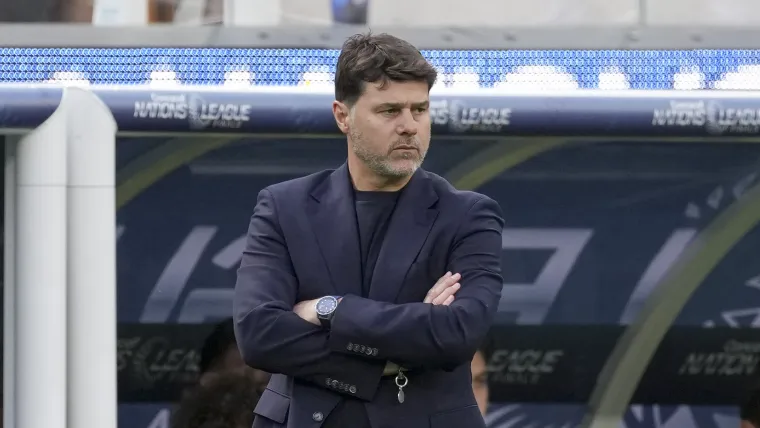
With the 2026 World Cup on home soil looming large, the U.S. Men`s National Team finds itself in what might be described as “timeline purgatory.” There`s an undeniable hum of expectation, a ticking clock, and a coach, Mauricio Pochettino, who seems to thrive not just on pressure, but on a carefully orchestrated form of tactical rebellion. His agenda for the USMNT is clear: harness an `organized chaos` that will leave opponents bewildered and fans on the edge of their seats.
Pochettino`s Paradox: The Method in the Madness
For a sport often revered for its meticulous game plans and rigid formations, Pochettino`s embrace of `organized chaos` might sound like a paradox concocted in a dimly lit tactical bunker by a mad scientist. Yet, for the Argentine tactician, it`s the very essence of unpredictability – a trait he openly admits to missing in modern football and one he vehemently despises being associated with his own teams.
“That is the thing that I hate, being predictable,” Pochettino declared, articulating a philosophy that champions offensive freedom without sacrificing defensive solidity.
The recent Concacaf Gold Cup, despite a final loss to Mexico, served as the initial proving ground for this unconventional approach. Pochettino purposefully deployed a squad rich with inexperienced players, using the tournament not merely as a quest for silverware, but as a crucible for his foundational principles: intense pressing, fighting for every ball, and a relentless, attack-minded style. Defenders, such as Chris Richards, find themselves anchoring a robust backline while offensive players are granted a surprising degree of latitude. “Offensively, he gives us a lot of freedom to do whatever we want,” Richards noted, highlighting the precise duality Pochettino seeks to embed.
Expanding the Arsenal: The Sixty-Player Gamble
Perhaps the most daring facet of Pochettino’s preparatory phase for 2026 is his ambitious expansion of the player pool to a staggering 60 individuals. In an era where team chemistry is often cited as paramount, this might appear, on the surface, to be a gamble, sacrificing cohesion for sheer volume. However, Pochettino’s logic is a firm one: leave no stone unturned.
His insistence on deep scouting, even for promising teenagers like FC Augsburg`s Noahkai Banks, speaks volumes. He fears the missed opportunity, the revelation of a generational talent only after it’s too late to integrate them effectively. This isn`t merely about having options; it`s about fostering an environment where complacency is a death sentence for aspirations of a World Cup spot.
As Chris Richards succinctly put it, reflecting the new regime`s ethos: “I agree that there probably isn`t a hierarchy anymore and that you`re only as good as your last camp… Every time you come into camp is a chance to earn your spot so your place is never safe.”
This relentless competition ensures that every training session, every friendly match, is an audition. It injects a competitive edge that, while potentially unsettling, promises to forge a squad hardened by constant evaluation and striving.
Key Cogs in the Chaotic Machine: Pulisic and Dest
Central to Pochettino’s vision of unpredictable brilliance are the individual talents capable of executing the `chaos` within the `organization.` Leading the charge is the undeniable “star boy” of American soccer, Christian Pulisic. His flair, dribbling ability, and knack for the unexpected are precisely the elements Pochettino seeks to unleash. Pulisic isn`t just a player; he`s a catalyst for the creative disruption that aims to disorient opposing defenses.
Adding another dynamic layer is the much-anticipated return of Sergino Dest. After a year sidelined by an ACL injury, Dest`s reintroduction to the squad is seen as a significant boost. Described by Richards as “probably the most attacking fullback in the world,” Dest embodies the versatility Pochettino prizes. His ability to operate comfortably on both flanks, push high into midfield, and contribute to scoring opportunities makes him a crucial piece in the fluid, free-flowing system. Pochettino envisions him not just as a defender, but as an auxiliary midfielder, a wide attacker – a player who blurs traditional positional lines to create numerical superiority and, naturally, chaos.
The Road Ahead: Performance Over Results (For Now)
With only a handful of friendlies remaining before the final fine-tuning for 2026, the current phase is less about racking up wins and more about strategic experimentation. Pochettino understands that immediate results, while always welcome for confidence, are secondary to perfecting his system and identifying the optimal personnel combinations. These matches against formidable opponents like South Korea and Japan are crucial for expanding the player pool and ingraining the tactical principles.
The journey to 2026 is a complex tapestry of development, competition, and tactical refinement. Pochettino, with his strict yet liberating philosophy, is weaving a narrative that prioritizes evolution over stagnation. It`s a bold strategy, perhaps even a risky one given the immense pressure of a home World Cup. But as the USMNT navigates its “timeline purgatory,” one thing is clear: under Pochettino, they will never be predictable. And in the beautiful, chaotic game of football, that might just be their greatest weapon.











